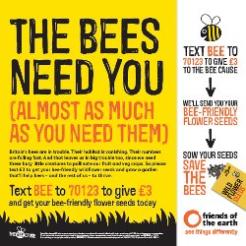You can't change the world single-handedly. So why are departments and charities set up to work to their own goals to the exclusion of each other? It's time for change, says Joe Jenkins.
If you accept we’re in the business of changing the world, (and if not, I’d suggest you’re in the wrong business) you’d have to be fairly foolish to believe that is something best achieved on your own.
Alone, no single person, organisation, community or business will achieve the visions we hold for a better future.
This sounds pretty obvious. Yet the opposite seems so often to be our guiding principle for the way we work. Teams within and across departments tasked with competing objectives; charities within and across sectors focused on their own goals to the exclusion of each other; supporters, activists, beneficiaries on the passive end of a barrage of communications.
When we try to go it alone, we may feel like we’re just getting things done. More typically, we’re being ineffective, missing opportunities and limiting our impact.
This year at the International Fundraising Congress, I will share Friends of the Earth’s attempts to grow our fundraising income, across the whole programme. When we’ve succeeded, the common thread has been integration - inside and outside the organisation – with a diversity of people delivering together on shared objectives and needs.
The most obvious example is our Bee Cause campaign. We recognised from the outset that if we genuinely wanted to be part of the generation that saved the bee, then we’d need to get a lot of people pulling together in the same direction.
A 'big tent'
Within the organisation, we brought together campaigners, fundraisers, communicators, resource teams and volunteers to deliver the campaign. We partnered with fabulous agencies who helped us reach thousands of people. We framed our campaign as a “big tent” that enabled us to collaborate with a huge range of groups and communities, from bee keepers and farmers, to retailers and scientists.
We brought together MPs from across the political spectrum, working together on national plans. And we ensured that the wider public’s role was never as a passive consumer of our messages, but as an active participant – getting their hands dirty planting seeds, creating fresh habitats for bees, informing our priorities and activities.
None of the above would have been possible if we’d started with a fundraising campaign, or a policy campaign, or a Friends of the Earth campaign that competed with other bees projects. The key was to begin with all those connections in mind and never try to go too far in any direction on our own.
The theme of my IFC session is Grow or die. Most cause-based organisations need to grow their reach, resources, capacity, impact – our ambition is always greater than our means. Treading water, (or in reality, declining) will not move us forward.
We must continually push ourselves to do better – to innovate within and beyond our existing range of activities. This means we cannot afford to be inefficient, to miss opportunities, to limit our impact.
Breaking down the artificial barriers we have constructed around us and creating stronger connections, at every level, is critical. Particularly for those of us who are serious about changing the world.
- The Resource Alliance’s International Fundraising Congress in the Netherlands takes place 14-17 October. This year's theme is inspire, connect and transform.








